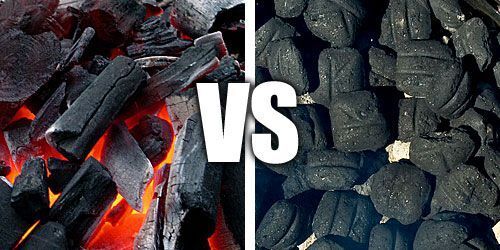

When it comes to charcoal grilling, the choice between lump charcoal and briquette charcoal can significantly impact your cooking experience and the flavor of your food. In this guide, we’ll explore the differences between lump charcoal and briquette charcoal to help you make an informed decision for your grilling needs.
Lump Charcoal: Lump charcoal is made from natural hardwood such as oak, hickory, or mesquite. It’s produced by burning wood in the absence of oxygen, resulting in chunks of charcoal with irregular shapes and sizes.
Briquette Charcoal: Briquette charcoal is manufactured using a blend of wood by-products, sawdust, and binders such as starch. The mixture is compressed into uniform pillow-shaped briquettes using pressure and additives.
Lump Charcoal: Lump charcoal tends to burn hotter and faster than briquettes due to its irregular shapes and lack of additives. It reaches high temperatures quickly, making it ideal for searing steaks and other meats.
Briquette Charcoal: Briquette charcoal burns more consistently and evenly compared to lump charcoal. It provides a steady, controlled heat that is well-suited for long cooking sessions and smoking meats.
Lump Charcoal: Many grilling enthusiasts prefer lump charcoal for its natural flavor and aroma. Since it’s made from hardwood, lump charcoal imparts a distinct smoky flavor to grilled foods without the added taste of binders or additives.
Briquette Charcoal: Briquette charcoal may contain fillers and binders that can impart a slight chemical taste to grilled foods, especially when initially lit. However, some brands offer briquettes made from natural ingredients that produce minimal off-flavors.
Lump Charcoal: Lump charcoal produces less ash compared to briquettes due to its pure wood composition. The minimal ash makes cleanup easier and reduces the risk of clogged vents or airflow issues during grilling.
Briquette Charcoal: Briquette charcoal tends to produce more ash as it burns, which may require more frequent cleaning of the grill and ash pan. Excessive ash buildup can hinder airflow and affect temperature control.
Lump Charcoal: Lump charcoal is often more expensive than briquette charcoal due to its natural composition and production process. However, prices may vary depending on the type of wood and brand.
Briquette Charcoal: Briquette charcoal is widely available and typically more affordable than lump charcoal. It’s convenient to purchase and comes in various sizes and shapes to suit different grilling needs.
The choice between lump charcoal and briquette charcoal depends on personal preference, cooking style, and budget. Experiment with both to discover which suits your grilling needs best for delicious results.